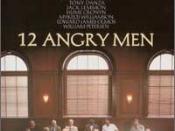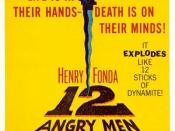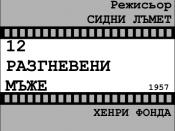"Two roads diverged in a yellow wood, and I-- / I took the one less traveled by, / And that has made all the difference" (Frost "The Road Not Taken" 18-20). Two great pieces of literature, Frost's poem and Reginald Rose's play 12 Angry Men, treat the theme of making difficult decisions with openness and honesty. In "The Road Not Taken," a man walks along a road in a "yellow wood." He comes to a fork in the road and must decide which path to take. In the end, he picks the road that not many people would have taken, "the one less traveled by." That choice made all the difference in his life. The characters in 12 Angry Men also must choose a path. Their path is marked by unreliable witnesses and hostile jurors. Although the jurors seemed to take a long time to choose a path, they finally picked the road that "wanted wear" and made the right choice.
Both the poem and the play reinforce the theme that everybody at some time or another must face and make difficult choices.
In the poem "The Road Not Taken" and the play 12 Angry Men the themes share similarities as well as differences. One similarity between the two pieces is that in "The Road Not Taken" and in 12 Angry Men, the speaker of the poem and the characters in the play had to make a choice: For the speaker of "The Road Not Taken," the choice was which road he should take; in 12 Angry Men the jurors had to decide whether the boy should be considered innocent or guilty. The similarity between the two choices is clear, because the speaker in "The Road Not...


